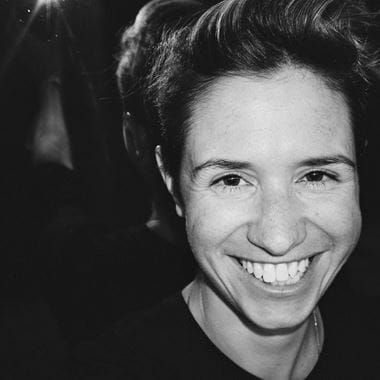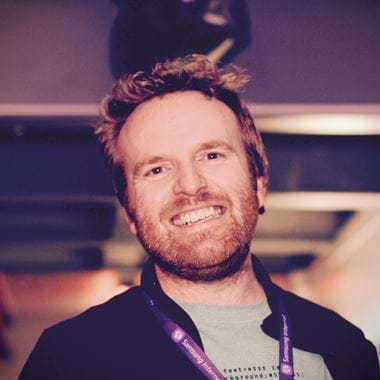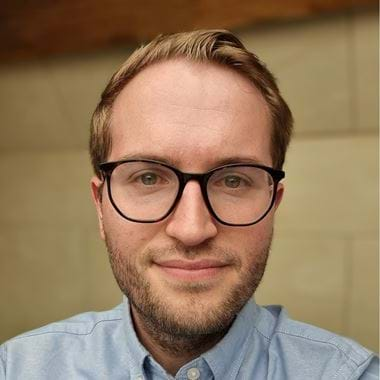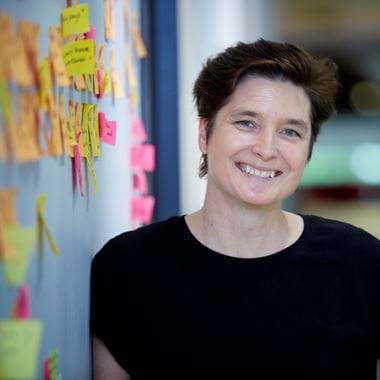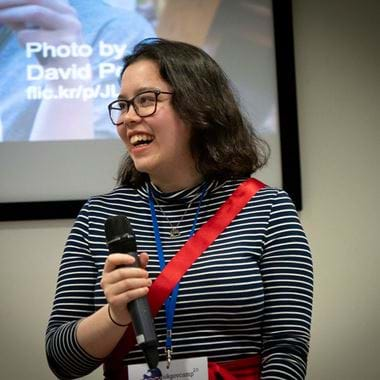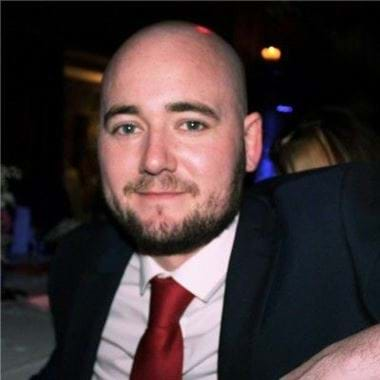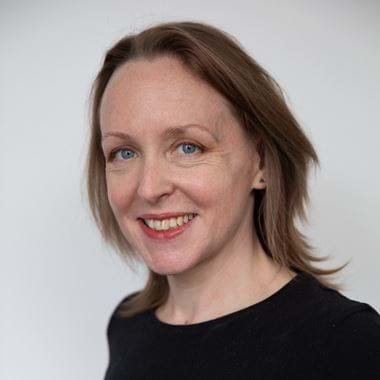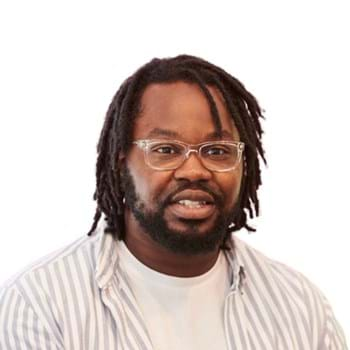
Julian Thompson
@JulesequityJulesequity on Twitter
Julian is a Design Leader and Strategist on a mission to create abundant and bold futures for Black communities. Weaving together his experience in community development, human rights, public policy and design, Julian explores the possibilities for deep and meaningful change.
As Founder and Design Director of Rooted, Julian leads a reparative Design company, working at the intersection of change, racial equity and imagination - reimagining how we create the future of society.
What if every digital team had an Afrofuturist?
This talk explores Afrofuturism as a critical lens to develop inclusive products and services - raising important questions about power and technological futures
Hello. Can everyone hear me okay? I can hear myself which is good! It's really good to be here. Really good to be here today. Really excited to be speaking to you all. Really privileged to have this time to share some of my musings and thinks about what it means to move towards a future that moves us towards black abundance and supports black African and Caribbean communities and helps them thrive. In this particular talk, I really want to touch on a few things that hopefully you are able to take back with you into your every‑day work, and into the organisations that you work in and through.
Before I deep‑dive into what I will be sharing today, I want to start with a grounding. A way to ground what I'm talking about in the lived experiences of others that have navigated systems in the futures of others that are thinking differently about how we do life and how we do change in the UK and abroad.
You are an ambassador of present realities. Reaching into futures and shaping these futures into powerful, intentionalities. Recognise that there are also powerful intentions enshrined in ancestry that are still shaping our presence for which you are a part of the great translating team. Hold this office well. You are holding a great responsibility. And I wanted to start with that grounding because, we are in this room. But we are not just here to learn and to engage, we are also here hopefully to be reminded of the responsibility and the potential of digital and design and data and technology.
I'm going to be talking to you today about a few things that have been sitting on my mind and sitting in the heart of Rooted. Rooted with a strategy research and design company, one of the only Black‑led, Black‑centred companies exploring the possibilities of change, exploring the possibilities of love for our communities. So that we can thrive. And hopefully we are shifting systems towards visions of Black abundance, rather than visions of poor outcomes, or realities of poor outcomes. We are shifting those things so that we can move to a better alternative future.
Here is a quick view of the team. And I share them whenever I go, because the thinking in this conversation and what I'm sharing today also comes from the work of this amazing team of individuals who're really committed to creating change on our terms. And creating change in a way that's lasting and really speaks to the futures of our communities and our families and our friends.
So, I want to do three things, or talk through three things. I want to set the context around socio digital futures, the physical world and what is happening with the digital space as well. I want to then share principles around Afrofuturism, give insight into what it is and also the philosophies that sit around this idea of envisioning futures that centre the realities of visions and dreams of the Black Diaspora in the UK. Finally, I would like to share some provocations and possibilities that hopefully begin to bring some of these things alive. But what I want to caveat to say is that today this talk is very much about provocation and hopefully something that stirs you to think differently about the future and about the work that you do. Root's work is about shifting futures from the margins to the centre. It's about recognising the voices, the people, the lived experiences, that sometimes goes invisiblised in the system. And as a result of that, it leads to inequalities and disparities, which I am sure many of you are aware of. As we begin to think about the future, and this word future, has been on my mind for ages, probably the last four to five years. I've been thinking so much about the future, not just the present, although I'm engaging in that, there's something important and powerful about what the future holds, who shapes the future and who is in the future.
Sociodigital futures talks about the idea that the world is changing. The world is moving. Digital technology’s devices and data are now woven into the fabric of the contemporary society. To describe this, we can say we live in a sociodigital world. Professor Suzanne Harford talks about this beautifully. There is a new space, a new world, which is emerging, that we need to be considering, and designing and shaping as well.
We live in a sociodigital world. You can see the social and you can see the digital world. You can see the realities of navigating the everyday physical experiences of life, whether that be going to the shop or to pay your tax or going to pick up your children from school. With the reality of the digital world that is coming to that, that's maybe given so much more information and prompting, and so much more reliance on those things as well.
One thing that feels important when talking about the sociodigital world, is that not only is it a new world that is emerging and there's new research emerging. What we are recognising is that actually in the midst of the pandemic, the climate crisis and widening inequalities, what lies ahead seems more uncertain than ever. The changes in technology, the changes in data, the changes in how we are navigating the world, even when we think about Covid and what that did and how we experienced that, change seems ever more uncertain, more uncertain than ever.
That brings me to this point, and this sits at the heart of the work that we do when we are engaging in our communities who might be experiencing challenges with debt or maternal health. There's this sense that anticipation for future confers great benefits to human well‑being and mental health. It's the idea that the anticipation for the future is so good for the way that we think about our mental health, it's so good for our well‑being. But not everyone gets to think about the future in a positive way. Not everyone gets to dream and vision about those things in a positive way, because we are wrapped up in the present, and wrapped up in the challenges of the present. So, when we think about the sociodigital futures, it's important to remember that not everyone has that excitement and actually sometimes there is some fear and trepidation about what change means. Especially if change has normally left us or you behind.
So, who gets the future? Who gets to imagine and dream and shape what the new digital realities look and feel like and how they are navigated?
there's something really important about recognising that so many people who are stuck or may be in this place of the present really struggle to think about the future in a way that feels meaningful.
In a way that helps them think about the positive things on the other side of the challenges that they may be navigating.
But those who need to be the most resilient in the face of crisis are often the least equipped to do so. Black communities are left reacting to, rather than planning and preparing for these futures and we see this in the work we do.
It brings us back to the idea again of, what happened, the impact of Covid? The realities of the inequalities it revealed. So, in Covid, we saw this massive surge or digital technology. We had to do life differently. We had to work differently; children were learning differently. If you were a parent trying to parent at home, or if you recognised that you couldn't communicate the same way that you could, things changed. How we consumed goods and services changed and the extension of Al algorithms changed. Covid and the pandemic had an impact, and we are still experiencing the change now.
In the midst of this change that's happening, there's a quote around, you know, if you are Black or an ethnic minority in Britain, it can often still feel like you are living in a different world. And this idea of different worlds, so whilst there is a sociodigital world emerging, whilst things are changing, maybe quite quickly, maybe there are some worlds not included in that, maybe there are some that are not fully comprehended in that.
And actually, this speaks volumes. Because whilst we are moving to new digital ways of understanding health and whilst we are finding new ways of trying to do the new norm, what it also revealed with a disparity that existed in the world itself, we saw a massive increase in disparity in the impact of Covid‑19, especially from Black African and Caribbean communities and other ethnic minorities. There was confusion and questioning as to why, what was happening, why were we dying at a faster rate and being serviced less to the degree than we'd want? What was happening in society at that time? But I think that whilst the new sociodigital world emerged, the problems of the new world remain. There's something really important about recognising, as we are moving to the digital futures and to understanding how technology's going to exist in the next ten, 20 years, and what means for our lives, but it's also something to remember about the problems and the challenges that exist now in this world too.
The Covid recovery. People talked about Build Back Better build it better. And actually, I think it's about Building Back Brave I think it's about thinking differently about how we create, how we dream, how we vision, how we include the voices, the futures of people who've typically been on the margins of many things.
So, digital, is it a friend or a foe? And there are so many ways that I sit with this question and I'm kind of like toing and froing at times, because you recognise the power of digital technology. But then you also have to think about the implications and the challenges.
As more and more examples of digital and injustices accumulate, it becomes clear that something is awfully off in the world of data.
When we think about what this means around algorithms and structural racism, when we think about the apparent injustices in the digital sphere, we know that there's more to be done here, we know it's important to think about, as we are designing the futures, how do we account for these things, how do we ensure that we don't replicate what we have in the existing world in the sociodigital worlds? Algorithms ‑ data privacy. Digital exclusion and poverty, digital colonisation. All these things are the shadow of digital, right. It's the shadow of the technology that we are using. These things can cause challenges, can cause racial bias, can cause people to feel insecure about their data. It can cause manipulation from commercial organisations. There was a reality that sits around some of these things and actually, sometimes the words might not always be given to it from those in the communities we work with, but there's a real feeling that something is happening and is shifting and is it going to shift and happen without us?
so, what kinds of sociodigital futures are being claimed and made, and who or what is shaping them?
I want to talk about Afrofuturism. And I have titled this resistance and reclamation. The reason why I want to bring in Afrofuturism at this point is that there's a principle and philosophy that sits around Afrofuturism which I think is a valuable contribution to the way that we are going to be designing and creating for the future of the world, and the sociodigital worlds too.
There are black people in the future. We are there, we are going to be there. And it means that actually, recognising that, how do we support, and we support communities? Think about ourselves in the future and ensure that the futures think very much about us as well. Communities want new worlds. New ways for society to work. New ways of being. New ways of experiencing. Alternative differences. More agency over how society works. More alternatives for how society work. And Afrofuturism, as a practise, as a discipline and philosophy, begins to bring this need together into something that hopefully we can think about when we are designing for the future and we are thinking about data and technology.
But in order to transcend our existing realities, we need to conceive new and alternative worlds. And this is what Afrofuturism invites us to do, to see a new and feel a new, not just create new ways to cope with the existing world that we have. This isn't about survival, this is about liberation and moving into abundance and possibilities around those things, which I believe is possible.
By but living in someone else's world can be tiring. Can be draining. Can be really challenging. And when we think about the world and the communities that we engage with and work with, it can often feel like they are living in a different world. We might feel like we are living in a different world, in so many ways. And Afrofuturism begins to ask the important questions about this world and the possibilities of this world. About the possibilities of the culture, history joy and art and philosophies and spirituality that exist within Black African and Caribbean communities. The possibilities of those things weaving and shaping, the future, and building as using the materials to build the future as well.
So, Afrofuturism. An intersection of imagination, technology, the future, and liberation. It aims to bring these things together, recognising that there is an interdependency between them that actually you shouldn’t be thinking about one without the other. The importance of thinking about imagination, but actually we also need to think about how our imagination liberates us into new things and not into old systems. When we are thinking about liberation, thinking about the role of technology, in actually not being oppressive in the liberation that we are trying to see. When we think about the future, we need to think about how all these things interplay, to help us understand what the future is or should be and what's the preferred way to get there.
Afrofuturists talk about Black people showing themselves as responsible for shaping the future. This isn't about putting the future and the change that's needed across poorer health outcomes or poorer educational outcomes in the hands of others. Afrofuturism begins to centre them in centre stage, as the people able to create this important change.
Afrofuturists build worlds and are building worlds based on joy, healing, liberation, invention, freedom. These are principles that feel important based on the histories of our communities and people. And it's important to bring these things in as we begin to think about how we do things differently.
So, what are the principles of Afrofuturism? And I'll share a few here. There's something important about reframing the relationship between technology, society and humanity. Something about recognising that they are interconnected. But they don't consume one another. They are all important and should be serving one another. It's also about protecting our traditions and resources. Afrofuturism thinks about the sustainability of a thing on our culture on the culture of people of how people meet and eat and engage and how children play. These micro‑communities and cultures that exist across the world and our cities, how can we preserve those and enhance those things as we think about the sociodigital future and the new world. It fights the things that relate to erasure. It fights for freedom and liberty of personhood. It's about dismantling power and recognising that those who've had power and have misused it actually need to give that power up in many ways. And we have to ensure that we are unlocked in our empowerment to take things into our own hands and think about the future in an effective way.
It's about agency. The agency to choose, the agency to move, the agency to thrive. These things are wrapped up in the concept of Afrofuturism. Some people might think of Afrofuturism with the science fiction piece and this idea Of Black Panther and Wakanda and those things have a very important place, but at the core of it are these principles.
And the question that I have been sitting with and my team, is, how do we apply these things in the work we do, and in supplying debt support services for local communities in south‑east London? How do we apply these things to be able to think differently about how people navigate environmental changes around health? And I want to talk us through. How do we do this? After all, my challenge is, what would it look like if app an Afrofuturist existed in our digital teams? What would it look like if someone who had the principles were sitting with us and working with us as you begin to think about these new technologies, services and products that we are creating. How powerful would it be to co‑create worlds that with not just for some but are for some who've been on the outskirts of society in some ways.
Afrofuturists talk about the power of imagination. It's recognising the history and the culture of the people, and understanding how we draw on those things to create new solutions. It's recognising what exists within our society and within our culture, are the philosophies, are the stories, the spiritualities. How do we draw on these things to think differently about what exists. The world of imagination is boundless.
The more I do this work in this field, it is more important, I realise how important it is. I said, "important" many times but how important it is to invite people into imagination, to ensure that actually, we are thinking about the limits of reality, but also be involved boundlessly, as well, as to what can be possible. So, why is it important? Why does Afrofuturism or Afro-futuristic, why does it centre imagination? Well, if we are not active in conceiving new alternatives, we will continue to live in someone else's future, which makes sense. If our brains, if our ability, if our dreams are not active in thinking beyond the constraints of what we see, then actually we end up living in a world that someone else, who has the time, the privilege and the space and the power to create, we inhabit those worlds instead. It also reverses the effects oppression has had on our imagination. This is really important, when we think about Afrofuturism. It is not just something that is aesthetic in thinking about science-fiction and how it works in this time. It also responds to the history. It also responds to the context. And imagines significance - one of the spoils of colonisation; which, in many ways, is plainly - who gets to imagine the future of geography? Losing our imagination is a symptom of trauma. Reclaiming the right to dream the future, strengthening the muscle to imagine together as Black people is a revolutionary decolonising activity.
It is whether it is the challenges or systems we sit in, we navigate, the imagination helps to us find something that might have been lost along the way. This speaks to the practice of equity in my view. We talk a lot about equity and in reclaiming equity, I think it actually invites us to not only repair the existing and current challenges, faced by communities but also to repair it, the repair of the imagination. It calls us to address the positioning of communities to imagine and determine their own futures. It is a reparative work, the work that we do, whether it be digital design, technology, and when we are engaging with communities, it is reparative work to allow them to rediscover their imagination. Equity is to make whole. I have been asked that question and as we have been thinking about equity, as I have mentioned, you know, Rooted, a lot of our work engages with the reality of inequity. Racial inequity. Ambient perception that is sit within that. Asking questions of how do we design differently? How do we create new methodologies, how do we engage with communities differently who have experienced inequity? What does it look like and part of this imagined work is important to that. Afrofuturism not only enquires about where that imagination is, invites us into that, it also thinking about unbounding Black imagination to create new worlds. It invites communities and people to try to step beyond what they currently experience, to think about this question mark. To think about what could be possible. But all too often, that new world hasn't been created by them. That new world isn't created by us, it's created by some. And Afrofuturism invites us to think differently about what that looks like. Think differently about how we can create a new world, together. So, going back to my title: What if every digital team had an Afrofuturism? What would the world look like? I want to touch on some provocation. One of the things I have realised is that in being imaginative, how can we actually flow our imaginations to real-life examples that can help us think about how we can apply this work? Someone might turn around and say - well I'm not an Afrofuturist. Thanks for this but how does it apply to my day-to-day? Actually, it is the philosophy, the things I shared earlier about what the practices are that involves communities, involves people who have typically been on the margins, into our work, in a really meaningful way. But I also want to provoke some thinking about what could be possible. Digital security. So, we have got, at Rooted, a real passion for working within the Criminal Justice System. And before I came, went into design, my first degree was in human rights. I wanted to become a barrister. And the reason I wanted to do that is because I saw the rate at which specifically Black men were being incarcerated within prisons. And we know that there are disparities around that. We know that there are disparities in the sentencing. We know there are disparities in the system as a whole. And I started to think about, if I was to step into the shoes of an Afrofuturist, and step into a person's shoes, what it would it be like for someone who has stepped out of prison and has a GPS tracker? It means that those from Black, Asian and Afro-Caribbean communities are more likely to end up back in prison. We know once they have left prison, the stop and search rates are higher and they receive harsher sentences for breaking curfew. So even through this Afrofuturism lens, I asked myself: What could it look like in the smallest way? We know that Afrofuturism is about preserving ourselves and empowerment. I thought - what if the GPS tracker also recorded police encounters. What if it recorded the encounters that someone who, is already biassed within the system, might encounter as they navigate a new world? What about if it provided routes to reconnect with nature. What if this tracker recognised someone who had been inside for a long period of time and was actually going to help them navigate the world completely differently. What would be the power of technology in that, if we could think about what it could do? This is a small provocation. You may turn around and say - that is not possible. That is not the point. The point is also to dream and think about the human. Remember, Afrofuturism begins to recognise our humanity doesn't get lost with AI and HR professionals. AI to support HR professionals predict performance or support with wellbeing. We are seeing how AI is being used in the world of work. It is great. Lots of advancements and powerful things happening. But we also know that there are disparities that Black, African and Caribbean people have in the world of work. The higher rates of unemployment, even with significant degrees. The higher rates of failing probation, the higher rates of small businesses, being able to succeed, as a start-out. So, that is a reality that sits there. and one of the things we have to think about is - well, what if AI was used to identify - just think about, identify departments less likely to hire people of colour. What if we use the predictive AI to look at the patterns that have so long existed across employment and begin to ask some new questions about how we can subvert those things. Data collection. Missing data experience for Black communities is huge. And again, as a company that is niche in exploring these things, often when we did the data about what Black people have as a service, sometimes it is not there. sometimes there is a disparity in what data is collected and recorded. Many people say if it is not recorded, it kept be measured, if it isn't measured it doesn't exist but we know the impact of inequality does exist. It makes a real challenge to get a clear picture. At Ada Lovelace they say Black data matters. How can data be owned by commuters and give a richer picture of cultural assets to inform community investment? How can we think about different ways of understanding, and understanding the lives of people that live in these different worlds at times? But those roles are really important. Those roles are to be looked after. So, with great power comes great responsibility. I think we are moving in an interesting age and time for technology and design data. I think there are lots of possibilities ahead. And as we begin to think about the sociodigital world and research is more done on how we shape those things and how those things will shape us, I think we who sit in this room and beyond, have a real big responsibility to ensure that actually we are thinking about those that have particularly not been involved in the shaping of those roles and those futures. So, in summary: Sociodigital futures creates a great opportunity. But also, a risk. There is great opportunity to think about these new worlds that are being created and actually these new worlds that are taking root. But also, there is a risk if we replicate the same issues, the same challenges, that those sociodigital worlds will reflect the same harms that exist in society today. Applying the principles are important in applying worlds that do not harm them that actually we need to think about Afrofuturism as a way to think about how it does not harm people. And there is also opportunity to use data and technology to create significant change for those who need to be centred in changing the world. There is something really important that we all have here about how we can think differently about a changing world. So, in closing, I want to reground us. You are an ambassador of present realities. Reaching into futures and shaping these futures into powerful intentions. Recognise that there are also powerful intentions enshrined in ancestry. That you are still shaping our presence, for which you are part of the great translating team. Hold this office well. You are holding a great responsibility. Thank you.
[Applause]
